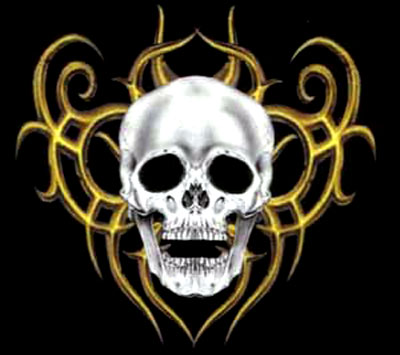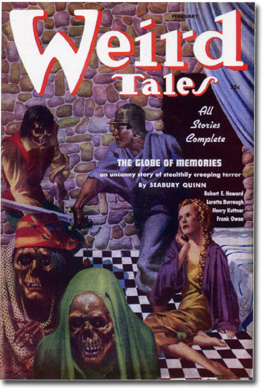Monday, March 12, 2007
posted by Steve Tompkins
Perhaps the most gratifying detail in this morning’s coverage of the box office brawn of Zack Snyder’s 300 is the news that in Greece the film demolished records for a March opening. Gotta say, though, the part of me that has always taken the outcome of the Peloponnesian War personally can’t help wishing for a few riots at midnight screenings in downtown Athens.
Meanwhile still no word on audience reactions in Tehran, Isfahan, Shiraz, and Qom…
Thursday, March 8, 2007
posted by Steve Tompkins
Most of us will recognize the following:
There is not one foot of British ground, not one handsbreadth of soil in England, Scotland, Ireland and Wales that has not been drenched with blood — my own blood — the same that courses through my veins. In every war, I have had kin on both sides.
All over the Isles they have marched and countermarched, fought, bled and died, or conquered — men whose blood is in me: Gael, Briton, Saxon, Dane, Norman; Irishmen, Scotchmen, Englishmen.
Along comes an Oxford geneticist, Dr. Stephen Oppenheimer, to assert that all of the Britannia-bloodying tribes and peoples Howard listed were in fact “immigrant minorities compared with the Basque pioneers who first ventured into the chilly, empty lands so recently vacated by the great ice sheets.” His article “Myths of British Ancestry” serves as a calling card for his 2006 book The Origins of the British: A Genetic Detective Story , which occasioned a New York Times article this week, “A United Kingdom? Maybe” by Nicholas Wade.
For Oppenheimer, author of the earlier Out of Eden: The Peopling of the World, the British Isles are “a genetic time capsule of southwestern Europe during the ice age.” He regards the notion of “a grand iron-age Celtic culture in the center of the continent, which shrank to a Western rump” once the legions marched north and westward, as hopelessly outmoded, and drop-kicks “migrationism,” that war-fueled motor of “The Hyborian Age,” on the basis of fact-gathering employing Y chromosomes and maternally bequeathed mitochondrial DNA. Prior to its repopulation by far-striding Iberians, Oppenheimer posits an unpeopled Britain “wiped clean of people by glaciers that had smothered northern Europe for about 4,000 years.” (But can we be sure? What about the ancestors of the Worms of the Earth?) He speculates that the possibly non-Celtic Belgae who straddled the Channel may have been responsible for English as “a separate, fourth branch of the Germanic language before the Roman invasion,” and draws upon the work of Dr. Peter Forster of Anglia Ruskin University, who, as the NYT article puts it, sees “the Angles and the Saxons [as] both really Viking peoples who began raiding Britain ahead of the accepted historical schedule.” Ahem–score one for Robert E. Howard!
(Continue reading this post)
Friday, March 2, 2007
posted by Steve Tompkins
Over at the REHupa blog not-quite-elder-statesman and pulphound-of-Tindalos Morgan Holmes debuted yesterday with a post entitled “A Howard Fan’s Journey Into the 21st Century: Part 1.” When I got to know Morgan in the mid-Nineties, he steered me to [redacted]’s five-novel Bard series (along with David Drake’s The Dragon Lord the most efficacious methadone with which to treat an addiction to Cormac Mac Art) and “Death’s Friend,” arguably the single best story Charles R. Saunders has written about Imaro; I steered him to David Gemmell. As Howard fans are in the habit of doing we also swapped origin stories, and Morgan’s was an eye-opener for me. Happening along in the wake of the baby boom, he essentially skipped the Sixties and that portion of the Seventies that preceded the proto-purist epiphany of the Berkley Conan collections. He had in a sense to double back later on to read Conan the Buccaneer and Conan of the Isles in the Ace reprints–O happy youth, to have Karl Edward Wagner cater his very first Cimmerian-themed party, one that wasn’t crashed by the emetic Sigurd of Vanaheim. To this day Morgan is not spirited away to a rec room reverie of Watergate hearings and Elton John singles the way some of us are whenever Barry (Windsor-)Smith’s tour de force work on “Red Nails” (The decidedly non-vegan stegosaur! That Tolkemec!) is mentioned, and he has no strong opinions about Roy Thomas either way, although my guess is the sword-and-sorcery savant in him might have enjoyed Conan the Barbarian fare like the two-part Elric guest-shot, the John Jakes-plotted issue, the adaptations of Norvell Page’s Flame Winds, a David A. English story, and Gardner Fox’s Kothar and the Conjurer’s Curse, or Thomas’ “Shambleau”-homage “The Garden of Death and Life.”
So the at least slightly atypical route that Morgan took to the Road of Kings prompts reflection that Time’s winged–and scythed–chariot has cut down the vanguard that met Robert E. Howard in the pulps as surely as it took the World War One veterans who still turned out for the Memorial Day parades of my childhood. The (few thousand?) readers who were initiated by the Gnome Press Conans can’t be far behind them. Assuming the Del Rey editions stay in print or at least serve as the template for subsequent re-launches, as the years drift or whiz by, for an eventual majority of Howard fans the jeremiads and j’accuses about posthumous collaborations, the “cut from the same cloth” generalization, Prince Conn, Juma the Kushite, Conan the Conqueror-versus-The Hour of the Dragon, and of course “The Treasure of Tranicos: Felony or Misdemeanor?” will be as distant and difficult to grasp as the Arian heresy and the Albigensian Crusade are for us. Not that the hoped-for traffic jam on the Road of Kings is likely to turn into a garlanded, starry-eyed, singing-from-the same-hymnal pilgrimage; the paradigm for Howard fans (except, overwhelming anecdotal evidence suggests, at Howard Days) will almost certainly remain Breck Elkins and buffalo hunters forced to “share” the same saloon…
Monday, February 26, 2007
posted by Steve Tompkins
Watching Clint Eastwood present a Lifetime Achievement Award to Ennio Morricone last night was as close as I’ll ever get to seeing Frank Frazetta give Robert E. Howard the Nobel Prize for Heroic Fantasy. Admittedly not an exact analogy, but close enough for rock-and-roll. Of course the sampler of il maestro‘s soundtracks should have concluded with the music from Harmonica and Frank’s ritualistic showdown in Once Upon a Time in the West, the ne plus ultra of a composer stepping in to co-write, co-direct, and co-act not just any crucial scene, but the crucial scene I would screen for xenoanthropologists from the Andromeda Galaxy who inquired about movies as an artform…
MARK ADDS: When they did their “Salute to Writers in Film” segment, I nurtured a hope that we’d get a shot of d’Onofrio shouting as he typed. Alas, it was not to be.
Saturday, February 24, 2007
posted by Steve Tompkins
Everyone is voting early and often for the 2007 Cimmerian Awards, right? In honor of the ongoing event, I’m here to hand out the Lemurian Awards for the 12 all-time best essays about Howard’s work. Why “Lemurian”? Well, TC‘s annual Awards for the 3 best essays are called the Hyrkanians, and as we know from “The Hyborian Age,” the Lemurians were the ancestors of the Hyrkanians (“Now the Lemurians enter history again, as the Hyrkanians…”) In honor of that prominent Lemurian and patron of the black arts Rotath, the actual awards will be skulls, like those we’ve come to know and lust after these past 3 years, only golden this time. (Our thanks to Auric Enterprises for the generous donation of the gold that went into the sculptings, and if you can’t place Auric Enterprises it’s time to reread Goldfinger). Given their model, I can’t guarantee that these Rotath-derived golden skulls will be curse-free, but faint heart ne’er toted trophy homeward.
Is there something fishy about the Lemurians? Damn straight, and why not; after all, there was something fishy about the (pseudo)historical Lemurians. “Men of the Shadows” describes them as “the half-human Men of the Sea. Perhaps from some strange sea-monster had those sprang, for they were scaly like unto a shark, and they could swim for hours under the water.” (There’s another hint in “The Cat and the Skull’ when Howard assures us that Kull is as at home in the water as any Lemurian). Wherein lies the fishiness? These choices are litcrit-intensive. I may be in the minority in Howard fandom in that I had some decent experiences as well as some appalling ones in English classes, but to me all litcrit really means is, articles that engage with Howard’s work. Yes, I find Howard the man fascinating, but I find him fascinating because he wrote the stories and the poems. Articles dealing with his life come a distant second, and articles dealing with his impact on the lives of fans come an even more distant third. My 12 Lemurian picks are ludicrously subjective and self-indulgent, and I’m sure Leo would be willing to extend his hospitality to guest-bloggers bristling with counter-lists. Lastly, the numerical sequence implies no hierarchy or qualitative ranking whatsoever; #1 is not necessarily superior to #12. It was hard enough selecting what I deem the dozen best without also trying to arrange them in order of merit. Save for the lone whippersnapper, these essays have not only stood the test of time but been granted tenured teaching positions by time.
(Continue reading this post)
Thursday, February 15, 2007
posted by Steve Tompkins

Late last year I was privy to a couple of Emails in which Fred Blosser and Morgan Holmes, Howardists of some repute, expressed skepticism about Michael Chabon, suspecting him of “slumming” in his faux-pulp or neo-pulp endeavors. So I was pleased when Leo relayed (by way of Don Herron) Scott Sheaffer’s report of an REH-mention by Chabon in the New York Times Sunday Magazine. He’s on the side of the angels, or at least the akaanas and Yagas, and instead of building a table-barricade in the dealers’ room at Pulpcon and glowering graybeardedly at him we should be grateful for his fond gravitation to the gaudy genres of yore. No Pulitzer Prize for Fiction has ever gone over so well with me as that notched by Chabon for The Amazing Adventures of Kavalier and Klay, as indispensable a fictional jamboree about the dawn of the superheroes and the Golden Age of Comic Books as Gerard Jones’ 2004 Men of Tomorrow: Geeks, Gangsters, and the Birth of the Comic Book is a factual one.
Kavalier and Klay rewards the attentive with allusions and in-jokes about pulps and weird fiction on every other page. Luna Moth, a somewhat nocturnal emission of the eponymous creators’ imaginations, battles in “dislocated non-Euclidean dream spaces” against “slavering Elder Creatures readying vast interdimensional armadas of demons.” And what of Luna’s origin?
Know that before my homeland, great Cimmeria, was plunged into eternal darkness, it was ruled by women. All were happy in the Queendom of Cimmeria, peaceful, contented — the men in particular. Then one shrivel-hearted malcontent, Nanok, schooled himself in the ways of bloodshed and black magic, and set himself upon an obsidian throne. He sent his armies of demons into battle against the peace-loving Cimmerians; the outcome was foreordained.
(Continue reading this post)
Friday, February 9, 2007
posted by Steve Tompkins

This Sunday night Masterpiece Theatre becomes Monsterpiece Theatre to present a new BBC version of Dracula starring Marc Warren, David Suchet, Sophia Myles, and Stephanie Leonidas. This latest re-imagining is a skimpy 90 minutes long and jettisons Renfield, plus the reviews, while mostly favorable, indicate that the concerns of Stewart Harcourt’s screenplay are as much venereal as arterial. Still, I will be tuning in, in part because of memories of what a big deal the 1973 made-for-television Dan Curtis/Richard Matheson/Jack Palance version was when I was in junior high school, and in part because this blog’s reason for being might have plunked himself down in front of the TV, if we can extrapolate from The Robert E. Howard Bookshelf, which notes the following in a letter to Tevis Clyde Smith on October 5, 1923:
I’ve had two cousins visiting me, whom I hadn’t seen for fifteen years. They’d read the International Adventure Library and from what they said, ‘Dracula’ is a humdinger.’ I’m going to order the set right away.
(Continue reading this post)
Tuesday, February 6, 2007
posted by Steve Tompkins

I’m staring moodily into my alehorn, like one of the Icelandic sagas’ barely socialized wolf’s-heads who can’t be trusted to behave in the skalli, pondering how best to retort on behalf of the disloyal opposition to Leo and Gary’s “If Loving the Lancers Is Wrong, We Don’t Want To Be Right” post. But before getting into that, I want to revisit a conflict of such escalatory excess that the groundskeepers of TC‘s Lion’s Den are still turning up unexploded munitions and unidentified body parts: The Farnsworth Wright War of 2005-2006.
Was Wright not just a good, but a great, editor? Or did he play Cardinal Richelieu in the story of Weird Tales’ Three Musketeers? With his tendency to reject in haste and repent at leisure, was he perhaps born with a unique chromosome, a “C” chromosome to go with his X and Y, that made him more capricious than should have been humanly possible? These questions and more were fought out in the Den, with Don Herron in particular storming the satrap Pharnabazus’ mausoleum to place satchel charge after satchel charge against Farny’s sarcophagus. A passage in Patrice’s Kull: Exile of Atlantis essay “Atlantean Genesis” got me thinking about the whole contretemps:
Howard, in a particularly unprofessional move, didn’t even rewrite his story, making all his changes on his first draft, and retitled the tale The Cat and the Skull, whose “Skull” is an explicit reference to Thulsa Doom. . .The story is rather poor and suffers from a lack of cohesiveness, which is not surprising given the late addition of Thulsa Doom. . .Not surprisingly, the story was rejected by Weird Tales, apparently to Howard’s surprise, if this is indeed the unnamed story he is alluding to in Post Oaks and Sand Roughs (p. 133). Undaunted, Howard wrote yet another tale featuring Kull, the second and last featuring Kuthulos, The Screaming Skull of Silence. The story was quickly submitted to Weird Tales and likewise rejected.
(Continue reading this post)
Thursday, February 1, 2007
posted by Steve Tompkins

Farewell and thanks to political columnist Molly Ivins, who was as sharp as a Bowie knife and took to the warpath in print at least as eventfully as Quanah Parker did on horseback. Despite the bruises she left them with, both Bush and Clinton managed grace notes about this great lady, the former calling her ‘a Texas original” yesterday and the latter admitting last year that she was “good when she praised me…and painfully good when she criticized me.”
Ivins once called the Texas Legislature “the best free entertainment in Austin,” which makes me wonder if we should have budgeted our time differently while in that city for the World Fantasy Convention. When I first began reading [redacted]’s work, his humor struck me as Ivins-esque at times, and for some of us who, rightly or wrongly, have been enraged ever since December of 2000, she, like Howard himself, was a reminder of what wondrous beings Texans can be. Hope she and Ann Richards are making inroads on the bourbon together wherever they are.
MARK ADDS: That’s one of the best compliments I’ve ever received, Steve. Thank you Molly, for being a wondrous Texan.
LEO ADDS: I wish Ivins all the best in the Hereafter, although to get out of the cheap seats she’ll need to bring all of her rhetorical powers to bear on massaging away the various witticisms she vomited at the Big Guy while here on earth. I wasn’t a fan: her famously funny, semi-Conan-related comment about Governor Schwarzenegger looking “exactly like a condom stuffed with walnuts” was plagiarized from conservative columnist Clive James, while her more substantial plagiarism of former National Review columnist Florence King still rankles. The Bush statement Steve mentions was telling — after calling her a “Texas original” he went on to say: “She was loved by her readers and by her many friends, particularly in Central Texas. I respected her convictions, her passionate belief in the power of words, and her ability to turn a phrase. She fought her illness with that same passion. Her quick wit and commitment to her beliefs will be missed. Laura and I send our condolences to Molly Ivins’ family and friends.” That’s far more grace and common decency than Ivins ever granted him, and I wonder if her reputation will long survive the dwindling half-life of the scathing political hatchet jobs for which she is most revered. I wouldn’t bet on it.
Tuesday, January 30, 2007
posted by Steve Tompkins

[redacted]’s recent post offering a breakdown of the recipients of all those Collected Letters sent me back to Dennis McHaney’s Howard in the Eyrie — The Conan Years: Part Four, Conclusion, a chapbook from December 2002 (The contents of which were amalgamated into Robert E. Howard: World’s Greatest Pulpster, which I’ve been lamentably late in getting around to ordering) On page 14 of the chapbook (page 99 of Pulpster), which deals with the Eyrie section of the February 1937 Weird Tales, Dennis quotes a letter from one Robert Locke, of Kansas City:
It is seldom that one writer will become enthralled by a fellow scribe’s creation. Yet Conan, the character created by Robert E. Howard, so captured my imagination that shortly before his untimely death, I wrote a letter to him expressing my admiration. The letter which Mr. Howard wrote me is one of my most prized possessions. In it he stated his appreciation for my interest and promised that he would write many more stories, carrying Conan through the mythical countries of Khitai, Khosala, Brythunia, Corinthia, etc. . .
This intrigues me for several reasons. That first generation of Howard fans was the only one that enjoyed what none of us ever have, a window of opportunity for give-and-take with Robert E. Howard while he was alive and writing. I can but echo Rob’s earlier thoughts on this issue–if even a dozen or two dozen handcrafted REH responses to fanmail moldered away in attics and cellars or were mulched in the Forties, Fifties, and subsequent decades, that’s an intolerable loss. Locke describes the one he received as a prized possession; could his heirs, and their heirs, be located by researching Kansas City public records? At this late date, any such effort would be staring down a barrel of diminishing returns, but still…
(Continue reading this post)









